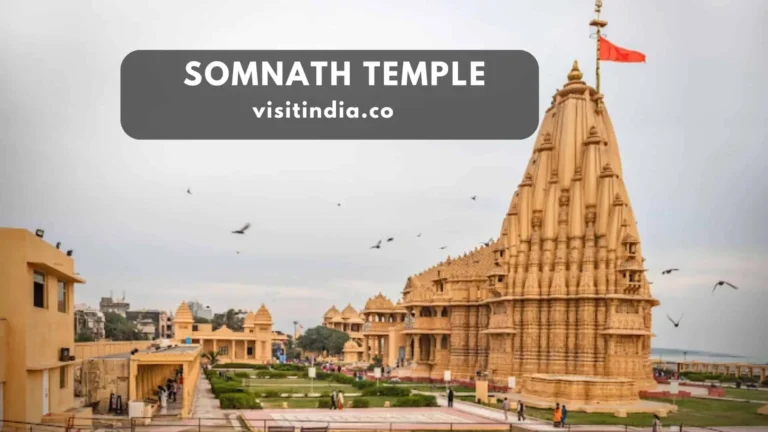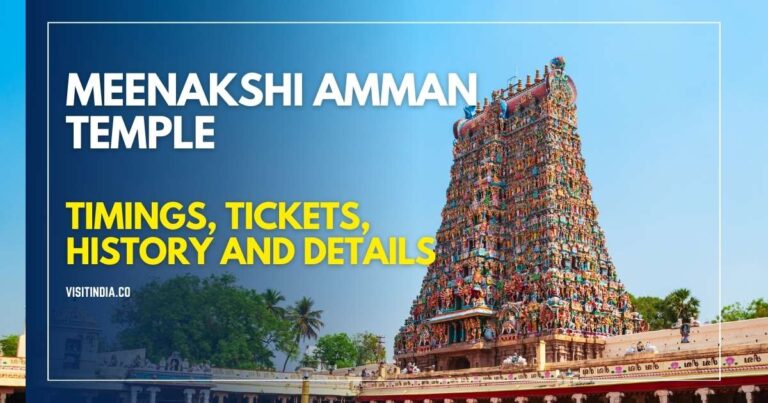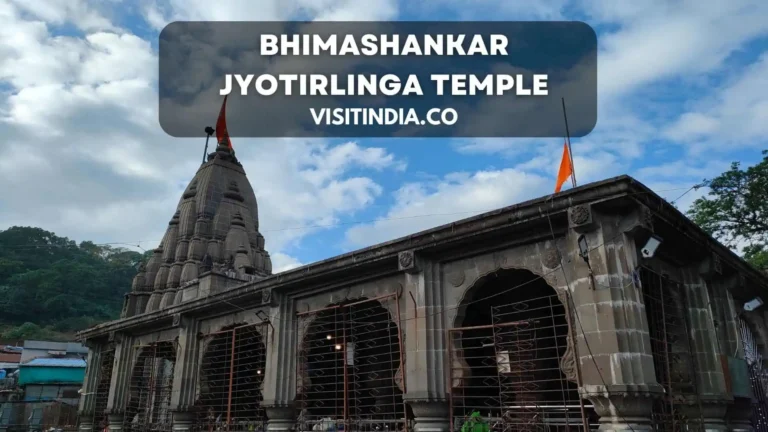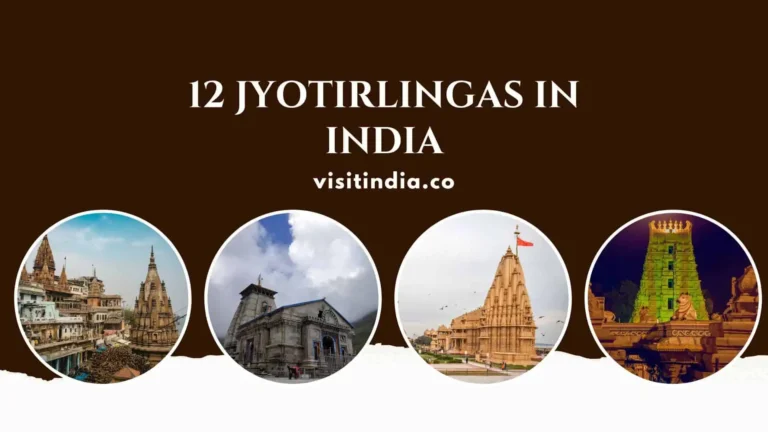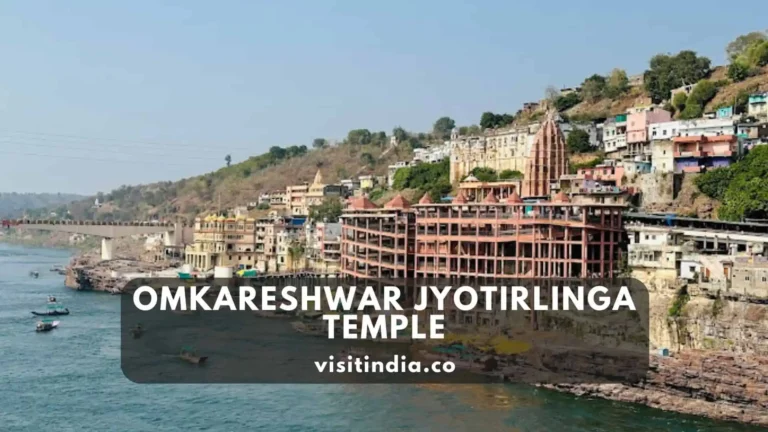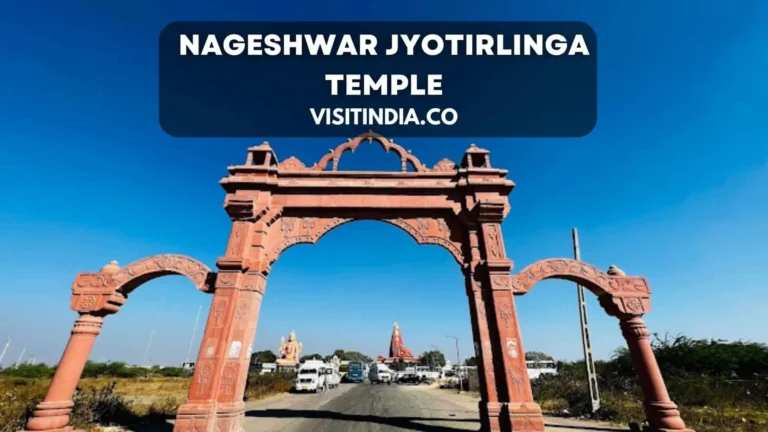Tirumala Tirupati Balaji Temple: Timings, Tickets, Darshan and TTD Accomodation
The Tirumala Tirupati Balaji Temple, perched atop the Tirumala hills in Andhra Pradesh, is one of the most visited and wealthiest temples in India. Dedicated to Lord Venkateswara, it attracts millions of devotees seeking divine blessings.
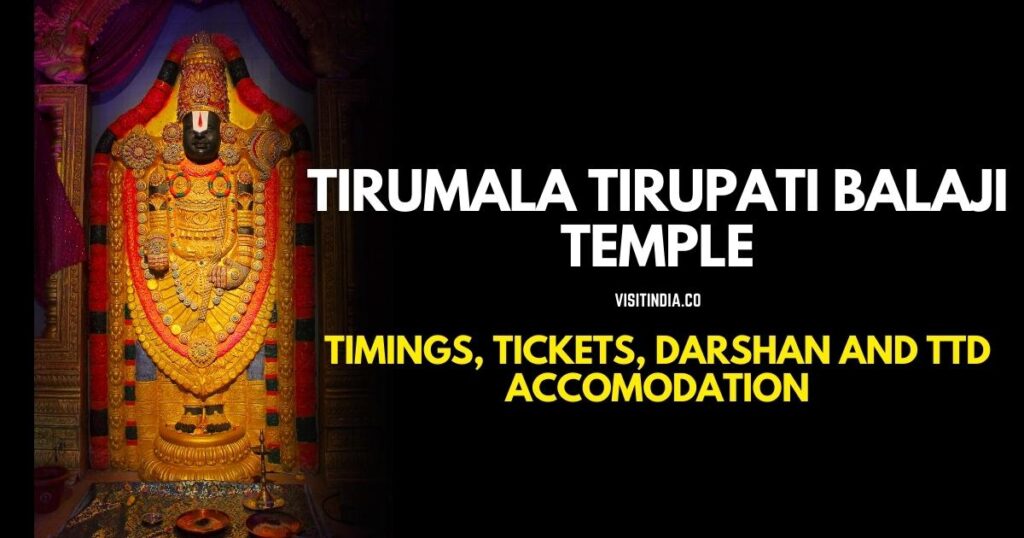
This guide provides all the essential information for a smooth pilgrimage, including temple timings, ticket booking details, and various types of darshan options. Learn about TTD (Tirumala Tirupati Devasthanams) accommodation facilities for a comfortable stay during your visit.
Whether you’re a devotee on a spiritual journey or a traveler exploring India’s religious heritage, this article offers everything you need to plan a fulfilling visit to the Tirumala Tirupati Balaji Temple.
See also: Meenakshi Amman Temple Timings, Tickets, History and Details
Tirupati Balaji Temple Timings and Best Time to Visit
The Tirumala Tirupati Temple operates on a meticulously planned daily schedule to accommodate the spiritual needs of its devotees. The day begins with the Suprabhatam seva from 2:30 AM to 3:00 AM, marking the ceremonial awakening of Lord Venkateswara.
This is followed by the Thomala Seva between 3:30 AM and 4:00 AM, and the Archana from 4:15 AM to 5:00 AM. Throughout the day, various sevas and darshans are conducted, with the temple typically closing around 10:30 PM after the Ekantha Seva. It’s important to note that specific timings can vary, especially during festivals or special occasions.
The temple’s spiritual calendar is rich with significant festivals. Brahmotsavam, usually held in September or October, is a grand nine-day event attracting millions of devotees. Another notable festival is Vaikunta Ekadasi, celebrated in December, marking the auspicious day when the Vaikunta Dwaram (heavenly gate) is opened. These festivals are characterized by elaborate rituals, processions, and a surge in pilgrim attendance.
For a more comfortable experience, the ideal time to visit is between November and February. During these months, the weather is pleasant, and the crowd density is relatively lower compared to the festive seasons.
Tirumala Tirupati Balaji Temple Poojas, Rituals, and Sevas
The Tirumala Tirupati Balaji Temple conducts a series of daily rituals and special sevas (services) that offer devotees unique opportunities to participate in the temple’s spiritual practices.
Daily Rituals and Services:
- Suprabhata Seva: This pre-dawn ritual, performed from 2:30 AM to 3:00 AM, involves waking the deity with hymns and prayers.
- Thomala Seva: Conducted between 3:30 AM and 4:00 AM, this service adorns the deity with garlands of fresh flowers.
- Archana: From 4:15 AM to 5:00 AM, priests perform the Archana, reciting the 1,000 names of the Lord and offering various items.
- Ekantha Seva: This final ritual of the day, around 10:30 PM, involves putting the deity to rest for the night.
Special Sevas:
- Kalyanotsavam: A daily ritual symbolizing the divine marriage of Lord Venkateswara and Goddess Lakshmi, performed at 10:00 AM.
- Arjita Brahmotsavam: A condensed version of the annual Brahmotsavam festival, featuring processions and rituals, conducted daily at 2:00 PM.
- Sahasra Deepalankarana Seva: Held in the evening, this service illuminates the temple with a thousand lamps, accompanied by devotional singing and dance.
Booking Sevas Online:
Devotees can book sevas through the TTD’s official website:
- Registration: Create an account on the TTD website by providing personal details and a valid email address.
- Login: Access your account using the registered credentials.
- Select Seva: Navigate to the ‘Seva’ section, choose the desired service, and check availability for preferred dates.
- Booking: Provide necessary details, proceed to payment, and confirm the booking.
- Confirmation: After successful payment, a confirmation receipt will be generated.
Note: Due to high demand, especially during festivals, it’s advisable to book sevas well in advance.
See also: Sabarimala Ayyappa Temple: Opening Dates, Timings, Ticket Booking, Route and History
Tirumala Tirupati Balaji Temple Darshan
Visiting the Tirumala Tirupati Balaji Temple is a profound spiritual experience, and understanding the various darshan options, queue systems, and expected conduct can enhance this journey.
Types of Darshan:
- Sarva Darshan (Free Darshan): This option allows devotees to view the deity without any charge. Pilgrims join a general queue, and waiting times can vary significantly based on the crowd.
- Special Entry Darshan (₹300 Ticket): For a quicker darshan experience, devotees can opt for this paid service. Tickets are available online through the temple’s official website and at designated counters.
- Divya Darshan: Specifically for pilgrims who trek to the temple via the Alipiri or Srivari Mettu footpaths. This darshan acknowledges the devotion of those who undertake the pilgrimage on foot.
- VIP Break Darshan: Designed for individuals seeking a more exclusive experience, this darshan typically has shorter waiting times. However, it’s essential to note that access to VIP Break Darshan is limited and often requires specific recommendations or contributions.
Queue and Waiting Time:
The temple employs a structured queue system to manage the vast number of devotees. For Sarva Darshan, pilgrims enter a queue complex leading to the main temple, with waiting times ranging from a few hours to an entire day, depending on the crowd.
Special Entry Darshan usually offers a faster process, but during peak seasons or festivals, waiting times can still be considerable. It’s advisable to check the temple’s official website or contact their helpline for real-time updates on waiting times.
Tirumala Tirupati Balaji Temple Tickets, Booking, and Online Services
Visiting the Tirumala Tirupati Balaji Temple involves understanding the various ticket categories, booking methods, and essential tips to ensure a smooth pilgrimage.
Ticket Categories:
- Sarva Darshan (Free Darshan): This option allows devotees to have a free viewing of the deity. Due to its popularity, waiting times can be extensive, especially during peak seasons.
- Special Entry Darshan (₹300 Ticket): For a quicker experience, this paid option is available. Tickets can be booked online in advance, and it’s advisable to do so, as slots fill up quickly.
- Arjitha Seva Tickets: These are for specific rituals and sevas performed within the temple. Each seva has its own significance and schedule. Booking these tickets can be challenging due to high demand, and they are often allocated through an electronic dip system.
Booking Methods:
- Online Booking: The Tirumala Tirupati Devasthanams (TTD) provides an official portal for booking darshan tickets, accommodations, and sevas. Devotees can register and book tickets up to 120 days in advance.
- Offline Booking: Limited on-site tickets are available at TTD counters in Tirupati and Tirumala. However, relying solely on offline booking is not recommended due to limited availability and potential long queues.
Important Booking Tips:
- Advance Planning: Especially during peak seasons and festivals, tickets can be booked months in advance. Regularly check the TTD website for ticket release dates and plan accordingly.
- Flexible Dates: If possible, keep your travel dates flexible to secure available slots, as certain days may have higher demand.
- Stay Informed: Follow official TTD announcements and updates to stay informed about any changes in booking procedures or availability.
Tirumala Tirupati Balaji Temple History and Mythology
The Tirumala Tirupati Balaji Temple, nestled in the Seshachalam Hills of Andhra Pradesh, stands as a beacon of devotion and architectural splendor. Its rich tapestry of mythology and history has drawn pilgrims and patrons for centuries.
Origin and Mythological Story:
According to Hindu tradition, Lord Vishnu incarnated as Lord Venkateswara to uplift humanity during the Kali Yuga. The legend narrates that Vishnu descended to Earth, choosing the Venkatadri hill as his abode, to bless devotees and alleviate their sufferings. This divine presence has made the temple a focal point of spiritual reverence.
Construction and Patronage:
The temple’s origins trace back to ancient times, with significant contributions from various dynasties:
- Pallava Dynasty (circa 4th to 9th centuries CE): Early inscriptions suggest that the Pallavas initiated the temple’s construction, laying the foundational structures.
- Chola Dynasty (circa 9th to 13th centuries CE): The Cholas expanded the temple complex, introducing intricate Dravidian architectural elements and ornate sculptures.
- Vijayanagara Empire (circa 14th to 17th centuries CE): Under their patronage, the temple saw substantial enhancements, including the addition of towering gopurams (gateway towers) and expansive mandapams (pillared halls).
Historical Milestones:
- Medieval Period: The temple received generous donations from various rulers, facilitating its growth into a significant religious center.
- Modern Era: In 1933, the administration of the temple was entrusted to the Tirumala Tirupati Devasthanams (TTD), an autonomous body responsible for its upkeep and the welfare of pilgrims.
The enduring legacy of the Tirumala Tirupati Balaji Temple reflects a harmonious blend of devotion, art, and history, continuing to inspire millions worldwide.
Tirumala Tirupati Balaji Temple Prasadam and Offerings
At the heart of the Tirumala Tirupati Balaji Temple experience is the distribution of prasadam, sacred offerings that hold deep spiritual significance for devotees.
Types of Prasadam:
- Tirupati Laddu: The most renowned offering, this laddu has been distributed to devotees for over 300 years. Made from premium ingredients like ghee, cashews, and raisins, it holds a Geographical Indication tag, signifying its unique association with the temple.
- Other Offerings: In addition to the laddu, the temple offers various prasadams such as vadas, tamarind rice, pongal, and curd rice. These are prepared daily in the temple’s kitchen, known as the ‘Potu’.
How to Obtain Prasadam:
After completing the darshan (viewing of the deity), devotees can collect the laddu prasadam from designated counters within the temple complex. Each devotee typically receives one small laddu as part of the darshan. For those desiring additional laddus, tokens can be purchased at specified rates.
Significance of Prasadam:
Prasadam is more than just a sacred offering; it embodies the blessings of Lord Venkateswara. Consuming it is believed to purify the mind and body, fostering a deeper spiritual connection. The act of partaking in prasadam symbolizes the sharing of divine grace among devotees, reinforcing communal bonds and spiritual unity.
Tirumala Tirupati Balaji Temple Food and Dining Options
The Tirumala Tirupati Devasthanams (TTD) ensures that devotees have access to nourishing meals and dining options during their pilgrimage.
TTD Annadanam (Free Meals):
TTD operates the Sri Venkateswara Nithya Annadanam Trust, providing free meals to pilgrims daily. Initiated in 1985, this program serves approximately 60,000 devotees each day, with numbers increasing during festivals. Meals are served at the Matrusri Tarigonda Vengamamba Annaprasadam Complex in Tirumala, offering hygienic and wholesome food.
Nearby Restaurants and Cafés:
For those seeking alternative dining options, several restaurants near the temple offer a variety of cuisines:
- Hotel Mayura: Located near the temple, it offers a range of South Indian dishes in a comfortable setting.
- Minerva Coffee Shop: Known for its authentic South Indian breakfast items and filter coffee.
- Andhra Spice: Offers traditional Andhra cuisine with a variety of vegetarian and non-vegetarian options.
- Sree Balaji Bhavan: A pure vegetarian restaurant serving North and South Indian dishes.
- Hyderabad House: Specializes in Hyderabadi biryanis and other Mughlai delicacies.
These establishments are located in Tirupati, at the base of the Tirumala hills, and are easily accessible by local transport.
Special Food Restrictions:
Devotees are expected to adhere to certain dietary guidelines during their visit:
- Vegetarianism: Consumption of non-vegetarian food is strictly prohibited in Tirumala.
- Alcohol and Tobacco: The use of alcohol and tobacco products is banned within the temple premises and surrounding areas.
- Fasting: Some devotees observe fasting or consume only simple vegetarian meals as a form of penance.
TTD Accommodation Options
Planning a pilgrimage to the Tirumala Tirupati Balaji Temple involves selecting suitable accommodation. The Tirumala Tirupati Devasthanams (TTD) offers various lodging options to cater to devotees’ needs.
Types of Accommodation:
- TTD-Managed Facilities:
- Rooms and Cottages: TTD provides a range of rooms and cottages in Tirumala, varying from basic to deluxe accommodations.
- Guesthouses: Facilities like the Srinivasam Complex in Tirupati offer comfortable lodging with amenities such as dormitories and individual rooms.
How to Book Accommodation:
Booking TTD accommodations can be done both online and offline.
Online Booking:
- Visit the Official TTD Website:
- Navigate to tirupatibalaji.ap.gov.in.
- User Registration/Login:
- New users must register by providing personal details and a valid email ID.
- Existing users can log in using their credentials.
- Select ‘Accommodation’:
- Choose the desired location (Tirumala or Tirupati) and accommodation type.
- Check Availability:
- Select the check-in and check-out dates to view available options.
- Provide Details:
- Enter the number of occupants and other required information.
- Make Payment:
- Proceed with the payment using available online options.
- Confirmation:
- Upon successful payment, a confirmation receipt will be generated.
Offline Booking:
- Current Booking Counters:
- TTD operates accommodation counters in Tirumala and Tirupati for on-spot bookings.
- Availability is on a first-come, first-served basis, and during peak seasons, securing a room can be challenging.
Important Tips for Booking Accommodation:
- Advance Booking:
- During peak seasons and festivals, accommodations fill up quickly.
- It’s advisable to book well in advance to secure preferred lodging.
- Location Consideration:
- Staying in Tirumala offers proximity to the temple but has limited facilities.
- Tirupati provides more amenities and transportation options to the temple.
- Check-In/Check-Out Timings:
- Be aware of the specific timings to plan your itinerary accordingly.
- Document Requirements:
- Carry valid ID proofs as they are mandatory during check-in.
How to Reach Tirupati Balaji Temple
Reaching the Tirumala Tirupati Balaji Temple is facilitated by a network of air, rail, and road connections, making it accessible from various parts of India.
By Air:
The nearest airport is Tirupati International Airport (TIR), located approximately 39 kilometers from the temple. The airport accommodates aircraft such as ATR 72-600, Boeing 737, and Airbus A320, and has a terminal capable of handling over 500 passengers per hour.
It offers flights to major cities like Chennai, Hyderabad, and Bangalore. Travelers can reach the temple from the airport via taxis or buses.
By Train:
Tirupati is well-connected by rail, with Tirupati Railway Station serving as the primary hub. Another key station is Renigunta Junction, approximately 10 kilometers from Tirupati, which serves as a major railhead for long-distance trains.
Regular train services link Tirupati to cities such as Chennai, Bengaluru, and Hyderabad. From Renigunta Junction, passengers can reach Tirupati by local trains, taxis, or buses.
By Road:
Tirupati is accessible via a network of well-maintained roads. The Andhra Pradesh State Road Transport Corporation (APSRTC) operates regular bus services connecting Tirupati to major cities:
- Chennai: Approximately 135 kilometers away, with a travel time of about 3.5 hours.
- Bengaluru: Approximately 250 kilometers away, with a travel time of about 5.5 hours.
- Hyderabad: Approximately 560 kilometers away, with a travel time of about 10 hours.
Private buses and taxis are also available for these routes. For those driving, National Highways provide direct access to Tirupati, with clear signage and rest facilities along the way.
Tips for Visiting Tirumala Tirupati Balaji Temple
Visiting the Tirumala Tirupati Balaji Temple requires thoughtful preparation to ensure a spiritually fulfilling and comfortable experience. Here are some essential tips for devotees:
Plan Your Visit in Advance:
- Booking: Due to the temple’s popularity, it’s advisable to book darshan tickets, accommodations, and seva (ritual) slots well ahead of your intended visit. The Tirumala Tirupati Devasthanams (TTD) offers online booking services, allowing reservations up to 120 days in advance.
- Peak Seasons: Be mindful of festival dates and weekends, as these periods see a surge in pilgrim numbers, leading to longer wait times and limited availability of services.
Follow the Dress Code:
- Men: Traditional attire such as dhoti or pyjamas with an upper cloth is recommended. While formal pants and shirts are generally accepted, for specific rituals and VIP darshans, traditional dress is mandatory.
- Women: Sarees or salwar kameez are appropriate. Avoid western outfits like shorts, skirts, sleeveless tops, and low-waist jeans, as they are not permitted within the temple premises.
Manage Your Time:
- Darshan Timings: The temple operates various darshan categories, each with specific timings. Familiarize yourself with these schedules to plan your visit effectively.
- Queue Management: To minimize waiting times, consider booking Special Entry Darshan tickets, which offer designated time slots. Arriving early, especially during peak periods, can also help in reducing wait times.
Safety and Health Tips:
- Medical Facilities: TTD provides medical services within the temple complex. In case of health issues, seek assistance from these facilities.
- COVID-19 Protocols: Stay updated on the latest health advisories and protocols issued by TTD and local authorities. Adhere to guidelines such as wearing masks, maintaining social distancing, and using hand sanitizers.
Elderly and Disabled Services:
- Special Darshan: TTD offers dedicated darshan timings for senior citizens (above 65 years) and differently-abled individuals, typically at 10:00 AM and 3:00 PM daily. Eligible devotees should carry valid identification and medical certificates.
- Facilities: Wheelchairs and assistance are available for those in need. It’s advisable to arrive at the designated entry points at least two hours before the scheduled darshan time to ensure a smooth experience.
See also: Maha Kumbh Mela 2025: Date, Place, Snan, Tents Details
Festivals and Events at Tirumala Tirupati Balaji Temple
The Tirumala Tirupati Balaji Temple is renowned for its vibrant festivals, each steeped in rich traditions and spiritual significance. These events draw millions of devotees annually, offering profound experiences of faith and devotion.
Major Festivals:
- Brahmotsavam: This nine-day festival, typically held in September or October, is one of the temple’s most significant events. It commemorates Lord Venkateswara’s manifestation and includes daily processions of the deity on various vahanas (vehicles), elaborate rituals, and cultural performances.
- Vaikunta Ekadasi: Celebrated in December or January, this festival marks the day when the Vaikunta Dwaram (the gate to Lord’s inner sanctum) is opened. Devotees believe that passing through this gate on Vaikunta Ekadasi leads to salvation. The temple witnesses special prayers and an influx of pilgrims during this time.
- Rathotsavam (Chariot Festival): This event involves the procession of Lord Venkateswara’s idol on a grand chariot through the temple streets. It’s a visual spectacle symbolizing the Lord’s journey to bless devotees, accompanied by chanting and devotional music.
Significance of Each Festival:
- Brahmotsavam: Initiated by Lord Brahma, this festival signifies the purification of devotees and the environment. Each day’s vahana procession represents different aspects of the divine, teaching various spiritual lessons.
- Vaikunta Ekadasi: This day is dedicated to Lord Vishnu’s victory over demonic forces, symbolizing the triumph of good over evil. Passing through the Vaikunta Dwaram is believed to grant liberation from the cycle of birth and death.
- Rathotsavam: The chariot procession represents the Lord’s outreach to his devotees, emphasizing accessibility and the importance of community participation in spiritual practices.
Visitor Tips for Festival Times:
- Advance Planning: Festivals attract large crowds, leading to longer wait times and limited accommodations. It’s advisable to book darshan tickets and lodging well in advance.
- Adhere to Dress Codes: The temple enforces a strict dress code, especially during festivals. Men should wear dhotis or pyjamas with an upper cloth, and women should wear sarees or salwar kameez.
- Health Precautions: Given the dense gatherings, ensure you stay hydrated and be mindful of personal belongings. If you’re traveling with the elderly or children, plan for their comfort during long waiting periods.
- Stay Informed: Keep an eye on official temple announcements for any changes in schedules or protocols, especially during major festivals.
Experiencing these festivals at the Tirumala Tirupati Balaji Temple offers a unique insight into the rich tapestry of Hindu traditions and deepens one’s spiritual journey.
